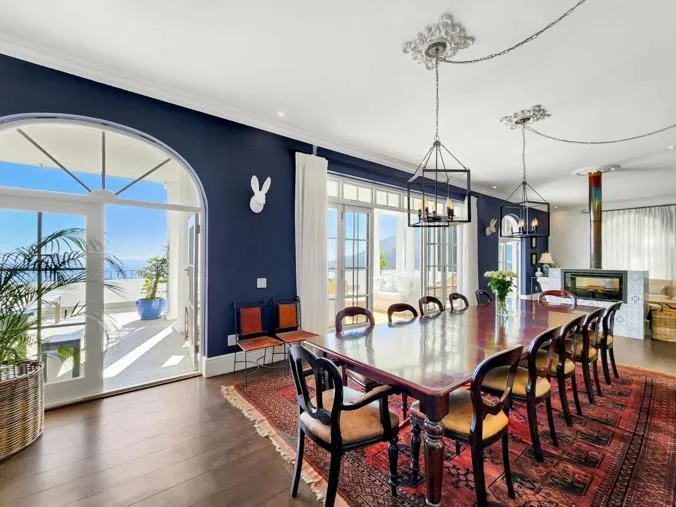Unlocking opportunities: how shared property models are transforming South Africa's real estate landscape

A shared property deal by two couples has landed them this deluxe Camps Bay property, which they will use as a holiday home.
Image: Supplied / Law Real Estate
More and more people are turning to shared property models that are unlocking new opportunities for South Africans to get into the property market, secure decent accommodation or even make a dream lifestyle become a reality.
In the ever-evolving residential property market, agents are witnessing an upswing in deals being penned between friends, relatives or fellow investors that open doors to property investment and long-term asset growth.
It also opens doors to those wanting to improve their lifestyle by co-leasing properties they would otherwise not be able to afford on their own - a scenario that affects virtually everyone.
Whether it's friends renting together, siblings buying an investment property or digital nomads sharing space, shared property deals in urban settings have increased in popularity over the years.
Lifestyle investing
"Independent Media Property" spoke to Warrick Wiegand of Law Real Estate, who shared that he's just concluded a sale involving two Durban couples who've pooled their financial resources to buy a luxury home in Camps Bay in Cape Town for R27.5 million.
"They plan on using it as a holiday home, with days marked off for each family in the course of the year. For the rest of the year, it will be let out as Airbnb, with both families splitting these costs and incomes," he said.

The five-bedroomed home has sweeping views of the Atlantic and Lion's Head.
Image: Supplied / Law Ral Estate
Changing lifestyles, pressures on households to make ends meet, and the prospect of becoming a property owner have all contributed to increased demand for shared property models, says Grant Smee, CEO of Only Realty Property Group.
He believes this new trend is set to shape the future of real estate.
“Ultimately, these shared models allow more people to participate in the property market, but they must be approached with proper planning, transparency and legal safeguards to protect all parties involved.”
He says the trend cuts across all age groups, from young professionals to seasoned investors.
Co-investing
Two such young investors are Rowan Chetty and his twin brother, Ricky*, 27, who made the bold move at the beginning of the year to invest together while they were still relatively young.
Born and raised in Verulam on the KwaZulu-Natal north coast, they'd both moved to Johannesburg, where they work in IT.
"We decided one day to invest together after a discussion about how going solo is more difficult and challenging. We then chatted to a few experts and decided that a joint investment was more feasible.
"We got a joint bond for an apartment in Greenstone, which is made up of young, dynamic people breaking into the corporate world, with property prices going up in the area," Chetty said, adding that they live there and have friends and family living in the suburb.
They have a paying tenant with a lease agreement that suits both parties.

Before taking the plunge to rent a luxury home together, experts suggest a few key steps that need to be followed.
Image: Pexels
Co-investing allows buyers to share the capital and returns of property ownership, with collective buying in South Africa allowing for up to 12 applicants on a single home loan by some financial institutions.
Mfundo Mabaso, FNB product head of Home and Structured Lending, said this solution is designed to help South Africans enter the property market and gain both affordability and access to larger home loans on more flexible terms by enabling them to combine incomes and deposits.
“FNB’s Collective Buying is a home loan solution that enables up to 12 individuals to jointly apply for a single bond.
"This way of investing in property comes with some benefits that a group of individuals can enjoy. Whether they are first-time buyers who want to occupy the property or buy as an investment, this home loan solution caters to those needs.
"Strategically, this solution responds to a few important realities: property prices in South Africa continue to outpace income growth for many first-time buyers, and younger or lower-income customers are increasingly looking for collaborative and innovative ways to build wealth. FNB’s Collective Buying allows families, friends, or even trusted groups of investors to not only share repayments and risks, but to co-create long-term asset value," he said.
Co-leasing
Tristen Henning, 28, who works in property management, says his decision to cohabit with a friend has given him access to a spacious three-bedroomed apartment in Blaauwbergstrand, Cape Town, which he would otherwise not be able to afford.
"The co-habiting format makes renting a place more realistic for people my age, and with the job market being what it is, it just makes a lot of sense," he said.
Smee says that in the rental space, there are a number of important legal requirements and risks that need to be thoroughly understood and pinned down before pals put pen to paper.
First off, you need a rental agreement in which two or more individuals sign the same lease and share equal legal responsibility for the entire property. This type of arrangement is commonly used by roommates, friends, couples or business partners sharing a commercial space.
If the landlord wants a lease with one primary leaseholder, all parties involved should sign a separate agreement that outlines each person's responsibilities.
"These contracts can typically be drawn up on your own or with the help of a professional, both of which are legally binding once signed,” Smee said.
He notes that in a case where two or more tenants sign a lease jointly, they are typically held jointly and severally liable.
“This means either tenant can be held responsible for the full rental amount or any damage to the property, regardless of who caused it. If one of the tenants chooses to move out over the period of the lease agreement, then a new contract will need to be drawn up.”
He suggests that co-leasing tenants enter a sub-agreement that includes the following:
- Financial obligations and how payments are split.
- Responsibility for deposits and damages.
- Process for early termination.
- Replacement of departing tenants.
“Early termination is a common source of conflict, so it’s vital to include clear terms,” says Smee. “Treat this like a business agreement, even among family or friends and ensure responsibilities around deposits and replacement tenants are clearly outlined.”
To mitigate potential issues, Smee advises that all housemates draft a written agreement covering essential topics:
- Expense breakdowns such as rent, utilities or Wi-Fi.
- House rules around communal living, such as guests and quiet hours.
- Cleaning schedules, chores and shared responsibilities.
- Exit terms in case one party wants to leave.
“All agreements, payments and relevant communications should be documented and stored. This can be vital if legal disputes arise. Having upfront clarity will help reduce disputes and ensure all parties are on the same page.”
On the co-buying front, he cautions that collective ownership comes with added complexity, making a clear legal structure imperative to deal with any of the following factors:
- Ownership shares and capital contributions must be documented.
- Roles and responsibilities must be clearly outlined, including who manages tenants, maintenance and accounting.
- Clarify profit and loss sharing arrangements.
- Include exit strategies outlining how the property will be sold and how one investor may exit the partnership.
- Include the dispute resolution processes.
“A formal partnership or co-ownership agreement, ideally drafted by a legal professional, is crucial to protect everyone’s interests.
“We’ve seen too many cases where informal agreements lead to costly disputes.”
* Not their real names.
Related Topics: